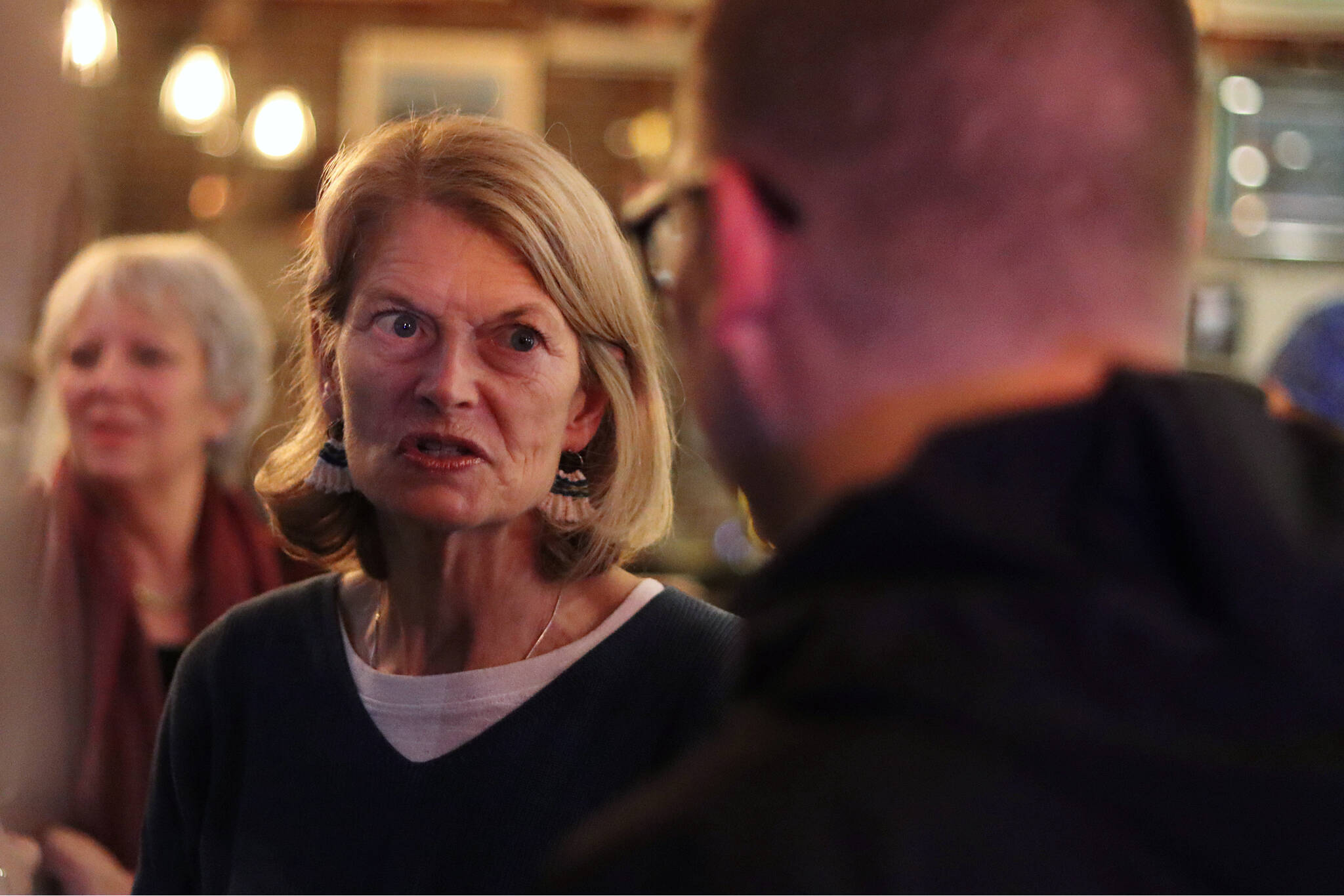This article has been updated to reflect addional results.
U.S. Sen. Lisa Murkowski had inched ahead of Kelly Tshibaka due to absentee and questioned ballots from Southeast Alaska voters in updated results of the Nov. 8 election released Friday evening. Those same tallies showed Gov. Mike Dunleavy and U.S. Rep. Mary Peltola appearing near certain to win reelection.
The results also show both chambers of the Alaska State Legislature may be led by bipartisan coalitions during the next session, in contrast to recent years when Republicans presided over the state Senate, potentially making it more difficult for Dunleavy as a Republican to pursue his agenda at the onset of his likely second term.
Friday is the deadline for domestic mail-in ballots to be received by the Alaska Division of Elections. International ballots will continue to be accepted until Wednesday’s final count.
Murkowski, who trailed fellow Republican Tshibaka by about 6% when the first results were reported Election Night, steadily closed the gap as subsequent ballots mostly from remote areas favoring the incumbent were tallied. With 264,994 ballots representing 44.03%% of registered voters tallied as of Friday night Murkowski has 43.32% of the vote to Tshibaka’s 42.68%, according to the elections division.
The results, which put Murkowski in the lead, came from the Southeast Alaska area known as Region I, which encompasses six House districts including the two in Juneau, according to elections officials. Those votes in general have been far more favorable to Murkowski and other moderate/liberal candidates compared to statewide averages.
Murkowski – who was censured by the Alaska’s Republican Party for supporting the impeachment of former President Donald Trump, who subsequently endorsed Tshibaka – is expected to prevail even if she doesn’t get a majority of first-choice ballots since many of the 10.35% of voters preferring Democrat Patricia Chesbro are expected to opt for Murkowski if they rank a second choice.
Tshibaka has questioned the legitimacy of the 2020 presidential election and indicated she may challenge the current election results because of “shenanigans” by political opponents. Numerous critics of ranked choice voting — which voters approved in a ballot initiative in 2020 – have called it a ploy by Murkowski and/or her supporters to ensure her reelection this year after falling out of favor with the state party establishment.
The furor about ranked choice voting is also playing large in the U.S. House race, where Peltola’s 48.68% of the current vote is well ahead of former Gov. Sarah Palin at 25.79% and Nick Begich III at 23.38%. Peltola, who became the first Democrat elected to Alaska’s lone House seat in about 50 years by winning a special election in August as well as the first woman to hold the seat and first Alaska Native elected to Congress, prevailed via ranked choice voting then because supporters of her two main Republican opponents failed to rank a second candidate.
Palin, who like Tshibaka has Trump’s endorsement and has expressed skepticism about election integrity, got back into the state’s political spotlight Thursday by being the first to sign an initiative petition by Alaskans for Honest Government to repeal ranked choice voting at an event in Anchorage. She told reporters, in a statement suggesting she expects to fall short in the election, she’s hoping the repeal effort “takes a big chunk” of her time.
“Because I’m passionate enough about it,” she said. “If it takes a chunk of my time, that’s indicative of the people caring about it.”
Dunleavy is the only candidate in the statewide races to get a majority of first-choice votes in any of the results since Election Night, although his total has declined slowly as more votes come in, and he currently stands at 50.34%. However, even if he drops below a majority there appears to be no viable path to victory for his two main opponents – Democrat Les Gara who has 24.17% of the vote and independent Bill Walker 20.72% — especially since the remaining 4.5% of the vote is for Republican Charlie Pierce, whose voters will almost certainly overwhelmingly rank Dunleavy second.
Nationwide Republicans fared worse than expected during the election and, with the exception of Dunleavy, the more favorable trend toward liberal-leaning politicians is affecting Alaska’s political landscape.
The trend is particularly notable in the state legislative races, which show the House with an even split between Republicans and Democrats/independents, suggesting the bipartisan leadership coalitions that have formed since 2017 will continue during the coming session. Initial House results suggested Republicans might win enough seats to form their own ruling coalition. Meanwhile, the Senate appears as if it also will opt for a bipartisan coalition after many years of Republican leadership.
The final results including the ranked choice tallies are scheduled at 4 p.m. next Wednesday. They will be broadcast live on KTOO, with other media, including the Juneau Empire, also covering it live.
• Contact reporter Mark Sabbatini at mark.sabbatini@juneauempire.com

